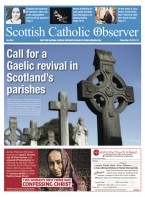December 16 | ![]() 0 COMMENTS
0 COMMENTS ![]() print
print

Church condemns proposed Glasgow job centre closures
The Catholic Church has united with the Church of Scotland to condemn ‘unacceptable’ plans to close up to half of the job centres in Glasgow.
Archbishop Philip Tartaglia of Glasgow said he was ‘very concerned’ by the UK Government’s Department of Work and Pensions (DWP) proposal to shut eight centres in some of the city’s most deprived areas.
“Sadly, Glasgow has one of the highest rates of unemployment in Scotland, and suffers high levels of deprivation as a result,” the archbishop (above) said. “Closing offices in some of the most deprived areas of the city, risks reducing access to support for those who need it most. I hope this proposal will be reconsidered in a way which respects the dignity of claimants and meets their needs.”
He warned that the closures could mean ‘tens of thousands of people will potentially have to travel further at additional cost to attend their appointments, while risking severe sanctions if they are even a few minutes late.’
The Church of Scotland also reacted with dismay, with Pauline Edmiston, vice convener of their Church and Society Council, saying they would ‘strongly resist’ the changes.
“If the DWP has to make savings then that should not be about punishing the poorest in our society even more,” she said. “These proposals will only make things harder.”
At 7.7 per cent, Glasgow has one of the highest rates of unemployment in Scotland and it is feared the plans could impact on more than 74,000 people. Closure of eight offices are proposed: Anniesland, Castlemilk, Maryhill, Bridgeton, Easterhouse, Parkhead, Cambuslang and Langside.
Chris Stephens, SNP MP for South West Glasgow, who is campaigning against the closures, said the churches’ response showed a ‘coalition of the caring was forming.’
“We’ve got the churches, the trade unions, foodbanks, Citizen’s Advice, all coming out against this,” he said. “It shows just how serious this issue is.”
The statement from the DWP said the closures would save public money and reflected an increase in the use of online and telephone services.










